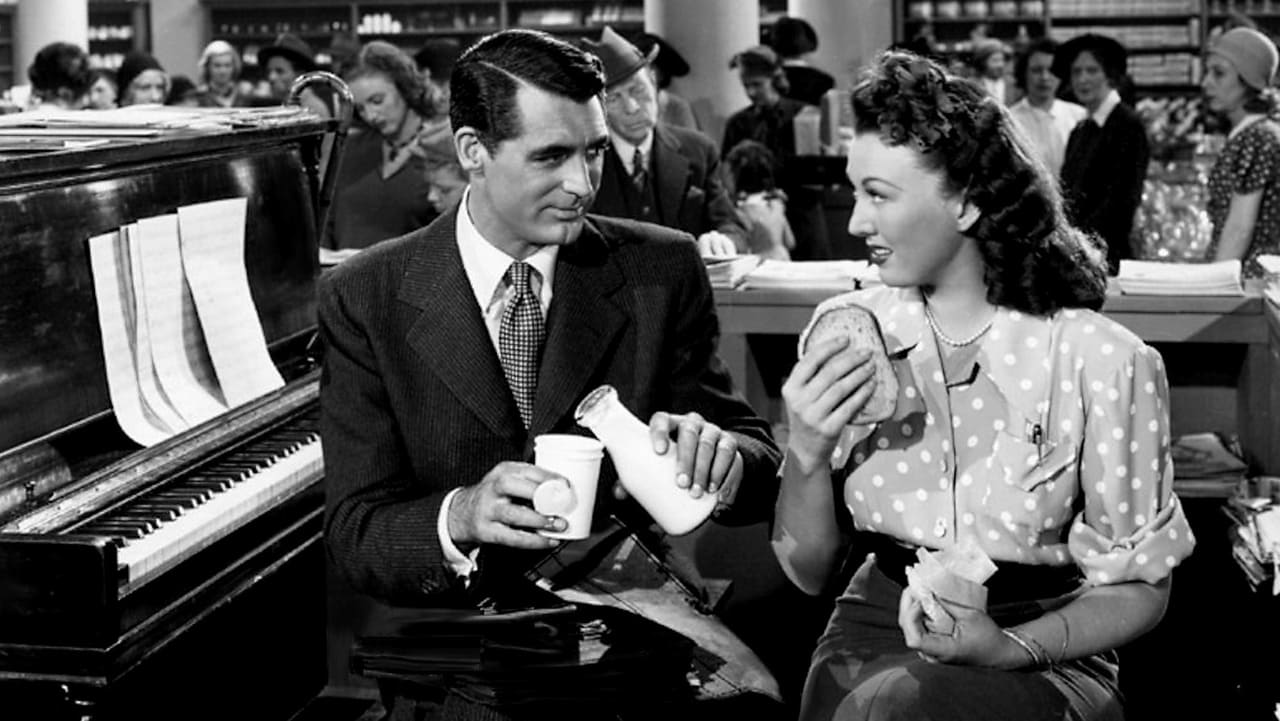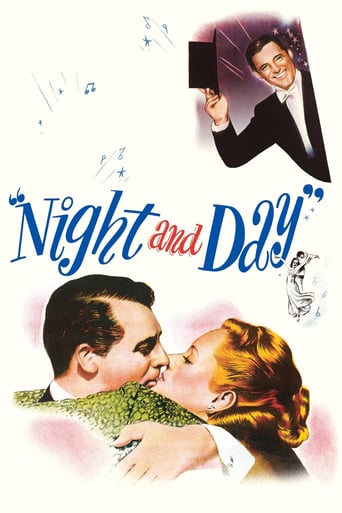

This is a very strange, very disappointing movie. No, not because it strays so far from the actual facts of Porter's biography; lots of biops, especially older ones, do that.This movie is strange because it featured so much talent with so little result.Michael Curtiz is one of my all-time favorite directors, having given us some of the greatest, most thoroughly engaging of all American movies: Casablanca, of course, but also Yankee Doodle Dandy, The Adventures of Robin Hood, Sea Hawk, and many more. They are movies of great passion without a dead minute.And yet, apart from some well-staged musical numbers, Night and Day is nothing BUT dead minutes. The episodic nature of the script doesn't help any; characters (especially women) appear and then vanish. But primarily, there is NO chemistry between Cary Grant/Cole Porter and any of the women in this movie.Was it because Grant and Curtiz knew that Porter was gay and were trying to suggest that despite the script? Somehow, I doubt it. Monty Woolly shows far more feeling for Porter - whom he knew in real life, of course - than Grant/Porter ever shows for any of the women in this picture. In the last shot, when Alexis Smith (Porter's wife) embraces Grant, his face still shows no real love, much less passion, for her. It is a very strange performance from a very great actor who was certainly quite capable of making sparks fly with women on the screen.In the end, I couldn't help but feel that the only convincing relationship in the movie was the one between Porter and Woolly, largely because of Woolly's acting, even though that is the part of Porter's biography that the movie was at least ostensibly trying to suppress.The rest of the movie is pretty flat as well. Cole had no real hardships on the road to success, other than his ill health, so there is not much to develop into drama. There are the clichéd "inspiration" scenes: Porter finds the lyrics to "Night and Day" one rainy night when a grandfather clock ticks and rain drops against a window outside, etc.If you like Porter's music, there are some well-staged numbers - though what should have been one of the best, Mary Martin's "My Heart Belongs to Daddy," with which she had such a great success on Broadway, somehow comes off flat. Woolly is good doing "Miss Otis sends her regrets," though it could have been staged better.If you're looking to learn about Cole Porter, this is not for you.But if you're looking for an engaging even if fictional story with interesting characters and engaging interaction, this really isn't for you either.What a shame all that talent went for so little.
... View MoreWhat a great movie! I'm sure I enjoyed it as much as I did, at least partially, because I appreciate Cole Porter music. This is a movie about the life of Cole Porter, and Cary Grant (one of my favorite actors) is excellent in the lead role. There is a strong support cast, with terrific singing and dancing. Mary Martin plays herself with a great performance in a small role. The colors are brilliant in the sets and costumes. I see this production as an excellent example of the modern musical film. Porter's music is the outstanding highlight. Although the script is mostly fiction, not the true story of Porter's life, the film is outstanding. I expect to watch this movie fairly often.
... View MoreThose looking for a biopic of Cole Porter would be better served elsewhere. This is the 1946 version of his life and it leaves out a lot of truth and stylizes the rest. The ending of the film gives those in the know a clue. When his wife (Alexis Smith) runs into his arms all excited, the camera shows that he isn't really as glad to see her as she is to see him. Maybe, that is because she left him, not for being a workaholic and ignoring her, as the movie suggests, but because his homosexuality was becoming more open in Hollywood.But, despite the glossy image of Porter, it was still a worthwhile film and it did get an Oscar nomination for the music, which should be no surprise to anyone. Porter's music is some of the best written and performed in the country and there are almost twenty of his songs featured in the film, some sung by Jane Wyman, the only Oscar winner that was the wife of a future president.Cary Grant is magnificent as Cole Porter. He makes the film worth viewing for his presence alone.
... View MoreWarner Brothers must have pumped a lot of cash into this production. It's splashy, moves quickly, and has beaucoup musical numbers. I wish it had somehow all paid off.Cary Grant was at his peak here in 1946, but he looks too old to be a Yalie. He doesn't look OLD. He never looked old, even when he was old, just as he never looked boyish. He seemed to just reach middle adulthood and stay there for fifty years.That wouldn't necessarily be a problem but he's not only the central figure but he's in every scene except the musical numbers, and he's in some of them too with his faux tenor, his vibrato making the walls tremble. Nobody else is of much significance. Monty Wooley should be funny, and perhaps he was in 1946, when beards were oddities. Alexis Smith looks glorious in glorious Technicolor.The film itself is almost a musical review, with episodes from somebody's fantasy of Cole Porter's escapades stuck in between. It's kind of an interesting problem. Porter wrote both music and lyrics, and some of them are playful ("You're the Top") and others blue-hued in their melancholy ("In the Still of the Night"). So why doesn't it play? What's the difference between this and, say, "Singin' in the Rain," given that this film has a more dramatic element. For one thing, there's no dancing to speak of here. One number, "I've Got You Under My Skin" is clumsily choreographed, the dancer seeming to practice her yoga mudrahs, a kind of manual of hands. It's okay when a musical lacks believability. Who believed any of Fred and Ginger's plots? What it lacks is exuberance.Porter's involvement in World War I (that's 1914 to 1918, kids) is romanticized. He gets the idea of "Begin the Beguine" from listening to shell bursts or something -- well, listening to what appear to be Morroccan troops humming in the gloomy night like darkies anyway. Somehow the film links his later, disabling riding accident to his wounds in the war and presents it in the most sentimentalized of ways. I mean, the guy is like FDR struggling to the stage to make his first speech. His homosexuality of course isn't even hinted at. But the writing is pretty careless throughout. The audience loses track of what the year is or what the name of the play is.Well, not to put the production down too much. The songs we hear are Porter's most popular and sophisticated, and they're popular for good reason. Porter was one of a dozen or so marvelous composers and lyricists who made the American stage blossom in the 30 years from 1925 to 1955. What a gang! Irving Berlin, another outstanding composer/lyricist of the period, couldn't even read music or play the piano except in one key! The music alone makes the movie worth watching once. Will someone explain to me what's happened to American vernacular music?
... View More